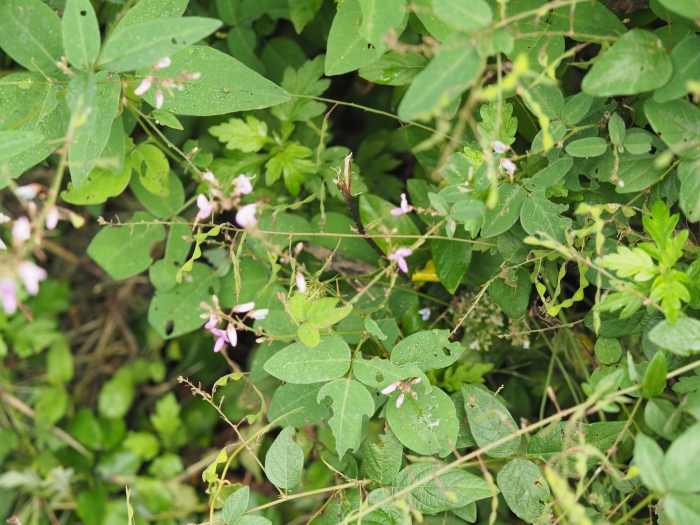Tall Tick-Trefoil
(Desmodium glabellum)
Tall Tick-Trefoil (Desmodium glabellum)
/
/

mefisher
Public Domain
Image By:
mefisher
Recorded By:
Copyright:
Public Domain
Copyright Notice:
Photo by: mefisher | License Type: Public Domain | License URL: http://creativecommons.org/publicdomain/zero/1.0/ | Rights Holder: mefisher | Publisher: iNaturalist | Date Created: 2018-09-15T10:18:08-07:00 |
























Estimated Native Range
Summary
Desmodium glabellum, commonly known as Tall Tick-Trefoil, is a deciduous perennial herb that is native to the open woodlands and forest edges of the Southeastern USA. It can grow up to 5 feet tall and features alternate, palmately trifoliate leaves. From June through September, it produces light pink to purplish flowers that are moderately showy. Following the flowering season, seeds develop in sticky pods that are arranged in a row of 2-5 segments from August to October. The plant is valued for its ability to fix nitrogen in the soil, which can improve soil fertility for surrounding plants.
Tall Tick-Trefoil is often used in native plant gardens, restoration projects, and for erosion control due to its extensive root system. It thrives in part shade, requiring low amounts of water, and prefers soils with medium to fast drainage, making it suitable for drier woodland gardens. While it is not commonly found in traditional ornamental gardens, its ecological benefits make it a useful plant for naturalized settings. It is also a host plant for several species of butterflies and moths, adding to its value for wildlife gardens. Care should be taken as it can self-seed and spread, potentially becoming weedy in favorable conditions.CC BY-SA 4.0
Tall Tick-Trefoil is often used in native plant gardens, restoration projects, and for erosion control due to its extensive root system. It thrives in part shade, requiring low amounts of water, and prefers soils with medium to fast drainage, making it suitable for drier woodland gardens. While it is not commonly found in traditional ornamental gardens, its ecological benefits make it a useful plant for naturalized settings. It is also a host plant for several species of butterflies and moths, adding to its value for wildlife gardens. Care should be taken as it can self-seed and spread, potentially becoming weedy in favorable conditions.CC BY-SA 4.0
Plant Description
- Plant Type: Herb
- Height: 1-5 feet
- Width: 1-2 feet
- Growth Rate: Moderate
- Flower Color: Purple, Pink
- Flowering Season: Summer
- Leaf Retention: Deciduous
Growth Requirements
- Sun: Part Shade
- Water: Low
- Drainage: Medium, Fast
Common Uses
Bee Garden, Butterfly Garden, Low Maintenance
Natural Habitat
Open woodlands and forest edges
Other Names
Common Names: Dillenius’ Ticktrefoil, Smooth Tick-Trefoil, Panicledleaf Ticktrefoil
Scientific Names: , Desmodium glabellum, Hedysarum glabellum, Meibomia glabella,
GBIF Accepted Name: Desmodium glabellum (Michx.) DC.